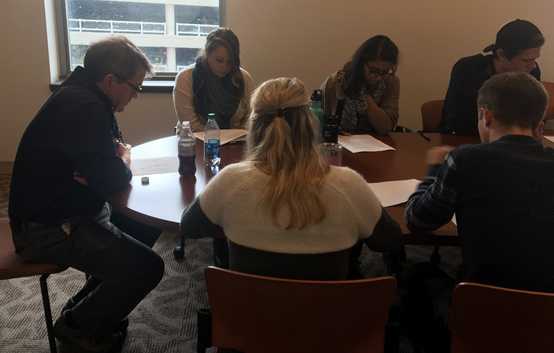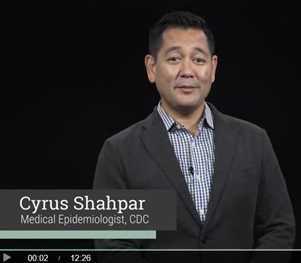CDC and Emory University Join Forces to Strengthen Responses to Public Health Emergencies

DGHP’s Emergency Response and Recovery Branch's Deputy Chief, Mark Anderson, leading students in a small breakout session at the Health in Complex Humanitarian Emergencies course at Emory in early 2017
Written by Adrienne Lefevre, MPH, CHES
It’s no secret that a passion for health and rapid response is a crucial component of finding and ending disease outbreaks. However, this can only go so far without a solid public health foundation to efficiently and effectively respond to public health emergencies, particularly in disaster and conflict settings where it may be challenging to detect and control disease outbreaks.
To provide training on the public health competencies needed during public health emergencies, in 2010 CDC’s Division of Global Health Protection’s (DGHP) Emergency Response and Recovery Branch (ERRB) and Emory University’s Center for Humanitarian Emergencies established the Complex Humanitarian Emergencies (CHE) certificate program at Emory’s Rollins School of Public Health. This unique program offers a series of trainings and practical opportunities to develop a cadre of skilled experts who can respond to public health humanitarian emergencies. The CHE certificate program, assisted by the enormous reach of online courses, helps CDC create a stronger public health workforce that is trained and equipped to better protect Americans from disease threats at home and abroad.

Cyrus Shahpar, Principal Deputy of the Global Rapid Response Team, is one of many ERRB experts featured on Coursera
Since the program began, 126 students have received the CHE certificate, with 50 more expected to graduate by 2018. Alumni of the program have gone on to a variety of careers related to public health and emergency response. A typical graduating class includes epidemiologists who search for the cause of outbreaks, program managers skilled at setting up and running operations centers, analysts that search data to find gaps in immunization coverage, and clinicians who provide medical care for pregnant women, malnourished children, and others.
The certificate program benefits from the differing strengths and experience of CDC and Emory professionals. Experts from ERRB taught one of the seven annual CHE certificate courses - Health in Complex Humanitarian Emergencies – in early January 2017. The course examines the technical and management fundamentals that must be in place to plan, carry out, and evaluate the range of complex health programs serving displaced populations in developing countries. Course modules focus on assessment, nutrition, surveillance, program management, and the epidemiology of major health problems such as psychological illnesses and communicable diseases like tuberculosis, and continued treatment for chronic diseases such as diabetes in the context of an international relief operation.
Other CHE certificate courses focus on specific topics relevant during emergency response efforts such as rapid assessment of disease and health threats, preparedness and planning, logistics, emergency risk communications, mental health, nutrition, and epidemiological methods.

DGHP’s Emergency Response and Recovery Branch Deputy Chief, Mark Anderson, instructing students at the Health in Complex Humanitarian Emergencies course at Emory
Because only 25 students are accepted into the highly competitive certificate program each year, ERRB and the Center for Humanitarian Emergencies expanded the program to make content available through online courses. In October 2016, the first online Coursera training was launched. Coursera allows participants to connect with thousands of other learners and debate ideas. It also allows them to discuss course material and get help mastering concepts. Key ERRB colleagues who participate in the in-person Health in Emergencies course worked with the Center of Humanitarian Emergencies and Coursera staff to develop the online course, which is free via the Coursera platform.
The online course covers the technical and management principles that are the basis of planning, implementing, and evaluating health programs during international relief operations. The course includes sessions on assessment, nutrition, epidemiology, surveillance, and program management. Course modules are tailored to people who would like to be involved in international emergency operations and cover general concepts. To date, the online Health in Complex Humanitarian Emergencies course has hosted over 2,800 learners and more than 80 have completed all four modules of the course.
In 2017, ERRB and the Center for Humanitarian Emergencies plan to adapt the Risk Communications during Global Public Health Emergencies course to an online platform. This course focuses on the role of communication during health emergencies.
- Page last reviewed: February 15, 2017
- Page last updated: February 15, 2017
- Content source:
Global Health
Notice: Linking to a non-federal site does not constitute an endorsement by HHS, CDC or any of its employees of the sponsors or the information and products presented on the site.


 ShareCompartir
ShareCompartir